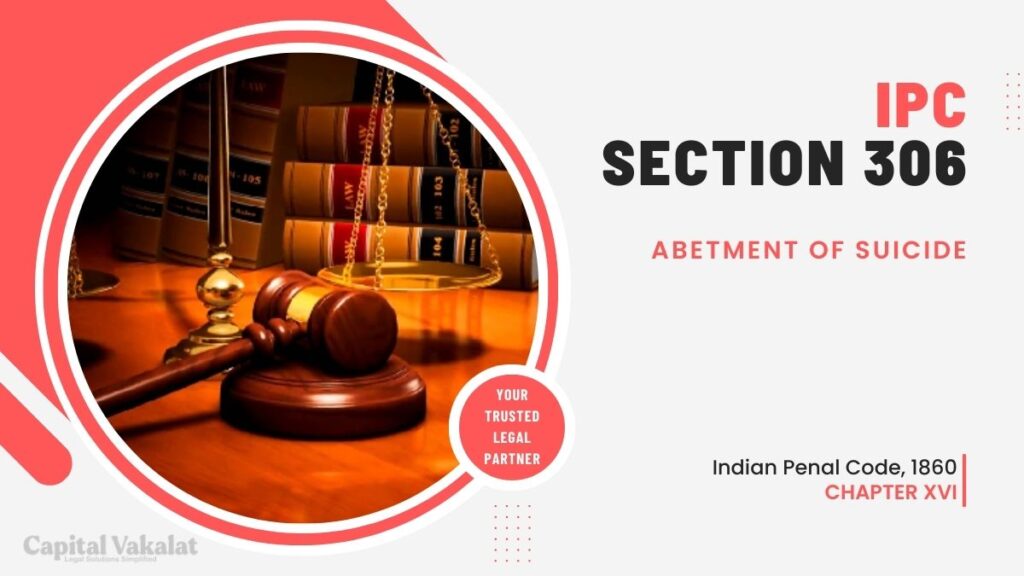Abetment of suicide, as defined under Section 306 of the Indian Penal Code (IPC), is a complex legal concept that involves aiding or encouraging an individual to take their own life.

In this article, we will delve into the various facets of Section 306, examining its elements, legal implications, controversies, and societal impact.
Definition of Section 306 IPC
Section 306 of the IPC outlines the legal framework concerning abetment of suicide. Abetment involves intentionally aiding, instigating, or encouraging someone to commit suicide, leading to grave legal consequences.
Overview of Abetment of Suicide
Understanding the nuances of abetment of suicide is crucial for comprehending the legal complexities surrounding this offense. This section will provide a foundational understanding of the concept.
Elements of Section 306 IPC
Mens Rea
Analyzing the mental state of the accused is essential in determining guilt under Section 306. We will explore the mens rea or the guilty mind that must accompany the act of abetment.
Actus Reus
Examining the physical act or actus reus is equally critical. What actions constitute abetment, and how are they interpreted within the legal framework? This section will shed light on the tangible aspects of the offense.
Intentional Assistance
Digging deeper into the intentional aspect of abetment, we will explore the ways in which assistance or encouragement is provided and its implications under the law.
Punishment and Legal Implications
Penalties under Section 306
Delving into the legal repercussions of abetment of suicide, we will discuss the penalties prescribed under Section 306 and their severity.
Landmark Cases
Examining notable legal cases involving Section 306 will provide insights into judicial interpretations and the evolving nature of this legal provision.
Evolving Jurisprudence
How has the interpretation of Section 306 evolved over time? This section will explore judicial trends and decisions that have shaped the legal landscape.
Criticisms and Controversies
Ambiguities in the Law
Critics argue that Section 306 is fraught with ambiguities. We will examine these ambiguities and their implications for both the accused and the legal system.
Misuse of Section 306
A critical analysis of instances where Section 306 has been misused will be explored, shedding light on the challenges in its practical application.
Suicide Prevention Initiatives
Social Awareness
Considering the broader societal context, we will discuss the role of social awareness in preventing instances of abetment of suicide.
Mental Health Support
Exploring the connection between mental health support systems and the prevention of abetment of suicide, this section will highlight the need for a comprehensive approach.
Impact on Society
Social Stigma
Examining the social stigma attached to individuals accused under Section 306, we will explore the broader impact on society and the accused.
Advocacy for Reforms
This section will discuss ongoing advocacy efforts and proposals for legal reforms aimed at addressing the shortcomings of Section 306.
Global Perspectives on Abetment of Suicide
A Comparative Analysis
Comparing the legal frameworks of different countries regarding abetment of suicide will provide a global perspective on this complex issue.
Recent Developments and Amendments
Legislative Changes
Analyzing recent legislative amendments related to abetment of suicide, we will explore how the law has adapted to contemporary challenges.
Judicial Interpretations
Examining recent judicial interpretations of Section 306 will provide insights into the evolving nature of this legal provision.
Conclusion
Summarizing the key points discussed throughout the article, the conclusion will provide a comprehensive overview of the legal, social, and global dimensions of abetment of suicide under Section 306 IPC.
Frequently Asked Questions
How can the legal system address the ambiguities in Section 306?
Ongoing legal reforms and clarifications in judicial interpretations are essential for addressing ambiguities.
Are there preventive measures outlined in the law to curb abetment of suicide?
While the law primarily focuses on punishment, societal awareness and mental health support are crucial preventive measures.
What role does mental health play in cases of abetment of suicide?
Mental health is a significant factor, and providing adequate support can contribute to prevention.
Is Section 306 IPC applicable only in India?
Yes, Section 306 is a provision in the Indian Penal Code and is applicable within the jurisdiction of India.